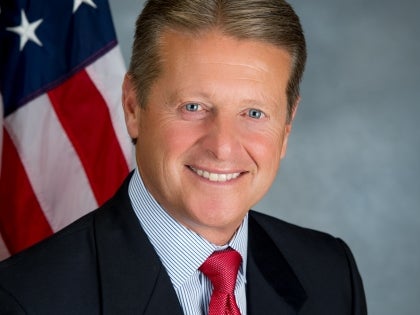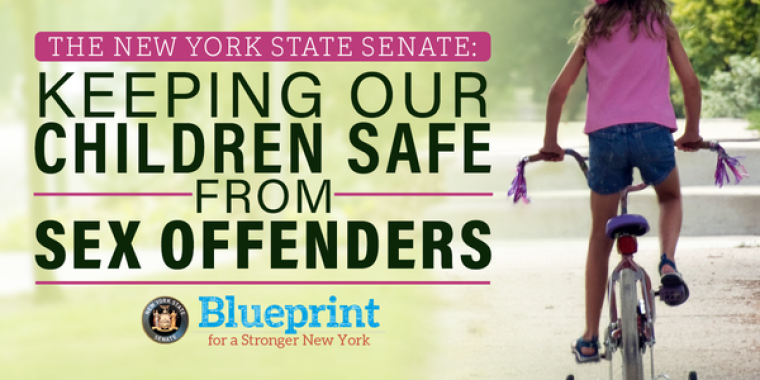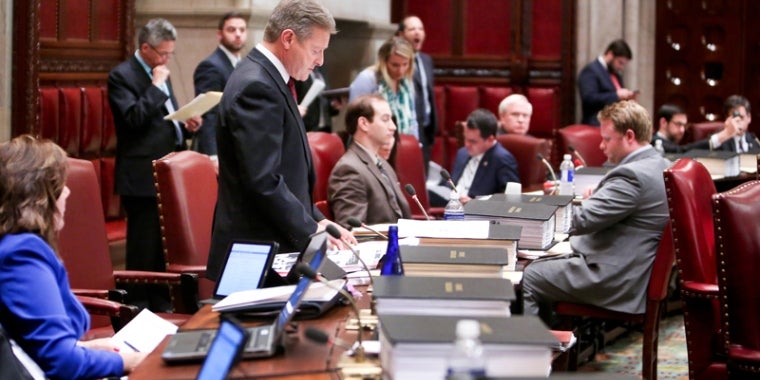
Senate Passes Legislation to Combat Sexual Abuse of Children
Jim Ranney
May 8, 2018
-
ISSUE:
- Sex Offenders

Senator Patrick M. Gallivan (R-C-I, Elma) says the New York State Senate has passed a package of critically important bills to strengthen the laws that will help protect children from abuse and sexual exploitation and prevent recurrences of sexual abuse through increased training, enhanced public awareness, and more restrictions on convicted sexual predators.
The package of legislation includes a measure to prevent child abuse in all educational settings. A bill (S7372B) sponsored by Senator Gallivan, expands the types of educational settings required to report child abuse and increases the professions required to receive training to identify and report abuse.
“As a state, we have an obligation to protect all children from abuse,” Gallivan said. “Teachers, school employees and others in positions of power who abuse students must be held accountable, regardless of the educational setting. No school – public, private or charter - should be exempt from the requirement that allegations and instances of abuse be reported to the proper authorities.”
Under current law, private schools are not included within the education law governing the reporting of child abuse in an educational setting, potentially putting students attending private schools at a greater risk. This new bill requires allegations of abuse at private schools, as well as charter schools, state-supported and state-operated schools, Special Act School Districts, and boards of cooperative educational services (BOCES), be reported directly to law enforcement.
It also expands the responsibility for reporting abuse allegations to include therapists, speech-language pathologists, teacher aides, school resource officers and any employee who contracts with a school to provide transportation to children. The legislation further amends education law to require that all teachers and administrators employed by a private or charter school to complete two hours of training regarding the identification and reporting of child abuse.
The Senate also approved a bill (S1981) sponsored by Senator Gallivan which requires the Office of Children and Family Services (OCFS) to notify local child protective services if a subject of an allegation of child abuse is the operator of a licensed or registered child care facility that received funding under the block grant for childcare. The notification will take place at the time OCFS transmits the report of suspected child abuse and will also include any person, if named as the subject of a report, is a known sex offender or has previously been subject of an indicated report of abuse or neglect.
Senator Gallivan also sponsored a bill (S2132) which requires the state to notify government officials and school leaders when sex offenders are transferred from a state facility to a community program or residence in their municipality. Notification must take place no later than 10 calendar days prior to the transfer.
In addition, the Senate approved the following bills:
- S5988A creates a critically needed criminal charge of sex trafficking of a child - eliminating the need to prove force, fraud, or coercion where a child under 18 engages in commercial sex.
- S7836 will help expand the availability of the Human Trafficking Intervention Court (HTIC) Initiative to reach more victims in more communities. The Courts were created to provide alternatives to incarceration for people arrested on prostitution charges, since many of the defendants were also victims of human trafficking. Currently, however, four of the six HTIC courts outside of New York City lack jurisdiction to see cases that originate outside of the local criminal courts where they are physically situated. This bill expands that jurisdiction so that more victims would be eligible to receive the crucial services.
- S33 requires the Office of Child and Family Services (OCFS) to deny the license or employment application if a background check reveals any felony convictions in New York State or any other jurisdiction for a sex offense, a crime against a child, a crime involving violence, or if a conviction for a felony drug-related offense occurred within the past five years.
- S249 allows law enforcement to disseminate information about a Level 2 sex offender’s employment address to vulnerable populations. Currently, Level 2 offenders’ employment addresses are included in the online Sex Offender Registry, but law enforcement is only allowed to notify schools and other vulnerable populations of the offender’s residence.
- S296 requires Level 3 sex offenders who have been convicted of violent crimes against children to wear an electronic monitoring device for life. The bill would also require the cost of the monitoring device to be absorbed by the sexual offender – not the state or local municipality.
- S399 creates a definition of residence under the Sex Offender Registry Act. It would be defined as any place of abode, domicile, or inhabitance where a convicted sex offender spends or intends to spend more than two days a week – closing a longstanding loophole that allows sex offenders to move around without being properly tracked.
- S962 expands access to information about all registered sex offenders available on the DCJS website to expand the utility of the registry and enhance the safety of New York's most vulnerable citizens.
- S1006A requires sex offenders to register a change of address and internet accounts no later than three days after the change. The legislation also requires local law enforcement to submit all changes of address and internet access provider forms to the registry.
- S1009 prohibits Level 3 sex offenders from living in college housing. College students on-campus generally live in very close quarters on their own for the first time. This measure takes into account that their safety could be compromised when sharing a living space with people they do not know anything about.
- S1635 requires employers, organizations, and government entities to complete a background check against the state’s Sex Offender Registry for all prospective employees and volunteers if their jobs include substantial contact with children. By updating existing law, sex offenders would be prohibited from working or volunteering with children in child care, recreational, entertainment, and other similar settings.
- S2170 closes a dangerous loophole that allows convicted sex offenders to be employed in positions that give them unsupervised access to residential properties such as property managers and building supervisors. This legislation would prohibit an individual who is a convicted sex offender from working or volunteering in such a position.
- S2595 amends current law to find any person who knowingly harbors, houses or employs a defaulting sex offender and who fails to contact law enforcement regarding the offender is guilty of a Class A misdemeanor.
- S2600 prohibits convicted sex offenders from operating automobiles participating in mobile application-based transportation networks (such as Uber and Lyft), or from being employed by such transportation networks.
- S2638 requires Level 2 sex offenders to appear in person at a law enforcement agency every year. This measure would help law enforcement confirm that the offender is located at the address previously given and that their appearance has not significantly changed.
- S3030A increases penalties for the failure of a sex offender to register or follow the standards of the Sex Offender Registration Act, or to work on an ice cream truck, a Class D felony.
- S4593A prohibits registered sex offenders from receiving treatment from any facility operated by the state providing non-emergency outpatient or inpatient psychiatric treatment that is operated in the same building as a state-operated children’s psychiatric center.
- S6420 ensures that victim and witness statements made to authorities regarding sexual abuse remain private and are not subject to disclosure to the general public through the Freedom of Information Law (FOIL). Victims of sexual abuse, as well as witnesses, are often reluctant to disclose abuse because they fear, among other things, embarrassment and retaliation for reporting it to the authorities. Making their reports publicly available and viewable by the media, sexual predators and cyberbullies would potentially deter them from reporting abuse.
- S6548 provides that information on a sex offender from another state who has not been assigned a risk level in New York must disclose as if he or she was a Level 1 or 2 sex offender.
- S2173 requires all sex offenders to verify their residence and registration with the state Division of Criminal Justice Services on a biannual basis. Under current law, Level 3 sex offenders must verify their registration every 90 days, but Level 1 and 2 offenders are only checked on once a year with a verification form on their anniversary of registration. This bill would not only increase the amount of times that all sex offenders have to verify their registration, but would also send the verification forms to each offender on a different random date.
- S1014 would establish the Sex Offender Public Awareness Program to help enrich outreach in schools, community groups, and clergy on the important issue of sex offenders being released back into society. The public awareness program would be operated at the local level, and would require the board of the potential program to make annual reports to the Governor and the Legislature on its work.
- S5201 extends the duration of the registration requirement for Level 1 sex offenders who were 21 or older at the time of their offense from 20 to 30 years. The bill would also allow local governments to adopt laws placing reasonable restrictions on where a sex offender is permitted to live in their community – a response to a recent New York State Court of Appeals decision that overturned all local residency restrictions pertaining to where a registered sex offender can live.
- S248 prohibits any sex offender from residing within a quarter mile of any school, playground, park, or building in which child daycare is provided, in an effort to protect New York children and other citizens who spend significant amounts of time at these safe havens.
- S968 prohibits sex offenders from residing within 1500 feet of the residence of their victim. This bill would help protect victims and their families from having to bear the burden or costs of moving because their offender moved back into their neighborhood, and prevent victims from having to tolerate the emotional distress caused by coming into contact with their abuser.
- S5348 restricts Level 3 sex offenders from working within 500 feet of any school or day care facility. Under New York law, Level 3 sex offenders are classified as the most dangerous of all sex offenders, and with a high risk of recidivism. This bill would add greater protection for New York children by placing them a safe distance away from the highest level offenders.
- S5386 prohibits Level 2 and 3 sex offenders, or offenders whose victim was a minor, from being on school grounds, or on the grounds of any facility or institution that cares for minors during the length of time the offender is required to register. Under current law, once a Level 2 or 3 sex offender is no longer on parole, the only provision to prevent them from entering onto school grounds is criminal trespass, something this bill would enhance and correct by requiring a lifetime prohibition for those offenders from ever setting foot on school grounds.
- S3027 prohibits registered sex offenders from residing in community residences in an effort to protect those with mental disabilities. Under current law, registered sex offenders are permitted to reside in facilities operated by or subject to licensure by the Office of Mental Health or the Office for People with Developmental Disabilities. This bill would put a stop to that by protecting New York’s most vulnerable individuals by keeping them separate from those who have committed sex crimes.
- S6189 would prohibit sex offenders released on parole or sentenced to probation from entering public, association, or free libraries. The bill would help protect children and families from worrying about their safety when entering a place of learning and community activities.
The bills will be sent to the Assembly.
-30-
related legislation
Share this Article or Press Release
Newsroom
Go to Newsroom
Senator Gallivan Announces State Aid for Libraries
December 17, 2025

Senator Gallivan Presents Liberty Medal to Off-Duty NYS Trooper
December 8, 2025

